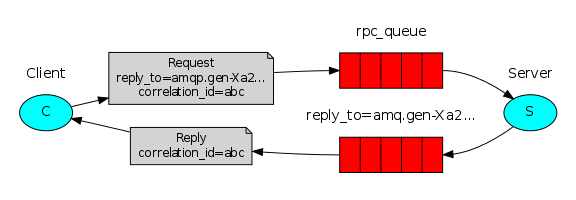amqp-rpc-factory
Node.js AMQP RPC Consumer and Publisher Factory
The consumer and publisher make pervasive use of Javascript Promises.
Code review, suggestions and pull requests very much welcome - thanks!
Credits
- Built on top of the fantastic amqplib library
- My faithful coding pair partners:
- mocha
- sinon.js
- chai
- gulpjs
- istanbul-js
Dependencies
Overview
RabbitMQ is a message broker.
Messaging brokers receive messages from publishers (applications that publish them, also known as producers) and route them to consumers (applications that process them).
amqp-rpc-factory creates AMQP RPC consumers and publishers.
Here's an image from the RabbitMQ website giving an overview of the RPC messaging process.
In this context Node.js is the blue circles, in between Node.js is TCP networking and the RabbitMQ server.

For more details see the RabbitMQ Tutorial - Remote procedure call (RPC)
Features
- Create an RPC consumer
- Create an RPC producer (command line use opens and closes a TCP connection per message)
- Create an RPC producer (server use opens a single TCP connection then opens and closes channels per message)
- Consumer graceful error control and retry
- Producer graceful error control and timeout
Install
npm install amqp-rpc-factory
Usage Example
- Create a simple RPC consumer and publisher that connect to a RabbitMQ server running on localhost
- The publisher will send a text string, the consumer will append '-OK' to the text string and return it.
- You will need two terminals, one for the consumer and one for the producer
Consumer - rpc-consumer.js
// Usage: node rpc-consumer.js
var consumerOptions = {
url: process.env.RABBITMQ_URL || 'localhost'
};
var consumer = require('amqp-rpc-factory').consumer.create(consumerOptions);
consumer.run();
Publisher - rpc-publisher.js
// Usage: node rpc-publisher.js
var rpcPublisherFactory = require('amqp-rpc-factory').publisher;
var publisher = rpcPublisherFactory.create({
standalone: true,
url: process.env.RABBITMQ_URL || 'localhost'
});
publisher.publish('message in a bottle')
.then(function publishSuccess(res) {
console.log(res);
})
.catch(function publishError(err) {
console.log(err);
});
Check out the examples for more details of the basic, advanced, advanced-jsonrpc and server features.
Consumer Options
processMessage: The function to handle processing the RPC request. Can standard Javascript Function or return a fulfilled Promise.connectionRetryInterval: default: 500msurl: default: 'localhost' - A valid amqp URI.socketOptions: default empty Object - The socket options will be passed to the socket library (net or tls). The socket options may also include the key noDelay, with a boolean value. If the value is true, this sets TCP_NODELAY on the underlying socket.queue: default: 'node_rpc_queue'queueOptions: default:{durable: true}- AMQP options passed to the queue. You may findautoDelete: trueuseful in place of durable if you wish the request queues cleaned up automatically.prefetch: default : 1 - Set the prefetch count for this channel. The count given is the maximum number of messages sent over the channel that can be awaiting acknowledgement. To consume multiple requests in the same process, in parallel, this must be set to greater than 1.logInfo: Log non-error messages, default console.info - Can pass in custom logger (example Bunyan)logError: Log error messages, default console.warn - Can pass in custom logger (example Bunyan)
Publisher Options
debugLevel: default: 0 - level 1 will log sent messages, level 2 will also log received messagesreplyTimeOutInterval: default: 3000 milliseconds - publisher timeout waiting for repliesstandalone: default: false - If true, close the connection on finish, otherwise just close the channel.url: default: 'localhost' - A valid amqp URI.socketOptions: default empty Object - The socket options will be passed to the socket library (net or tls). The socket options may also include the key noDelay, with a boolean value. If the value is true, this sets TCP_NODELAY on the underlying socket.queue: default: 'node_rpc_queue'queueOptions: default:{exclusive: true, autoDelete: true}- AMQP options passed to the queue.logInfo: Log non-error messages, default console.log - Can pass in custom logger (example Bunyan)logError: Log error messages, default console.log - Can pass in custom logger (example Bunyan)
Tests
git clone git@github.com:rudijs/amqp.node-rpc-factory.gitcd amqp.node-rpc-factorynpm installgulp testTEST_QUIET=true gulp test(stubs out the logging output on the console)gulp lint
Development
gulp watch-testTEST_QUIET=true watch-testgulp watch-lint
